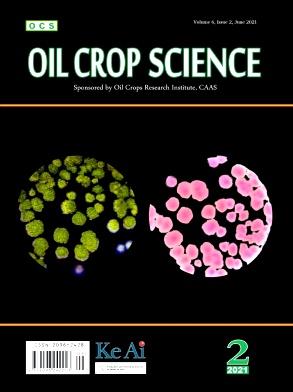The importance of sulphur in oilseed production – A South Asian context
Q3 Agricultural and Biological Sciences
引用次数: 0
Abstract
Sulphur (S) is essential for the quality of oilseed crops, ranking as the fourth major nutrient after nitrogen (N), phosphorus (P), and potassium (K). While crops need sulphur in slightly lower amounts than phosphorus, maintaining optimum sulphur levels is crucial for oilseed yield and quality. Factors such as sulphur dynamics, impact of deficiency, application methods, and climate change must be addressed to improve agricultural practices. In South Asian countries like India, Pakistan, and Bangladesh, oilseeds are vital to the agricultural economy, supporting food security, livelihoods, and economic growth. However, climate change, marginal land cultivation, and a shift to more profitable crops like wheat and maize have led to a decline in oilseed productivity. Sulphur is particularly important for vital plant functions, including protein synthesis, chlorophyll formation, and resistance to abiotic stress. Proper management of sulphur can significantly enhance the yield, oil content, and seed quality. Sulphur fertilization improves crop resilience to pests, diseases, and environmental stresses, resulting in healthier plants. To optimize oilseed production, best practices for sulphur management like integrated nutrient management, regular soil testing, and the strategic application of sulphur-enriched fertilizers must be adopted. Despite its significance, many South Asian soils suffer from sulphur deficiency due to inadequate replenishment and reliance on high-analysis fertilizers. By enhancing sulphur availability, oilseed producers can significantly increase crop yields, improve oil content, and promote overall plant health, contributing to the agricultural economy and food security in the region. This manuscript aims to evaluate the critical role of sulphur in enhancing the yield, oil quality, and stress resilience of oilseed crops in South Asia.
硫在油籽生产中的重要性——南亚背景
硫对油籽作物的品质至关重要,是继氮(N)、磷(P)和钾(K)之后的第四大养分。虽然作物对硫的需要量略低于磷,但保持最佳硫水平对油籽产量和品质至关重要。必须解决诸如硫动态、缺硫影响、施用方法和气候变化等因素,以改善农业实践。在印度、巴基斯坦和孟加拉国等南亚国家,油籽对农业经济至关重要,支持着粮食安全、生计和经济增长。然而,气候变化、边际土地耕作以及转向小麦和玉米等更有利可图的作物,导致油籽产量下降。硫对重要的植物功能尤其重要,包括蛋白质合成、叶绿素形成和对非生物胁迫的抗性。适当的硫管理可以显著提高产量、含油量和种子品质。硫肥可以提高作物对病虫害和环境压力的抵御能力,使植物更健康。为了优化油籽生产,必须采用综合养分管理、定期土壤测试和战略性施用富硫肥料等硫管理的最佳做法。尽管它具有重要意义,但许多南亚土壤由于补充不足和依赖高分析肥料而遭受缺硫。通过提高硫的可用性,油籽生产者可以显著提高作物产量,改善含油量,促进植物整体健康,从而促进该地区的农业经济和粮食安全。本文旨在评价硫在提高南亚油籽作物产量、油质和抗逆性方面的关键作用。
本文章由计算机程序翻译,如有差异,请以英文原文为准。
求助全文
约1分钟内获得全文
求助全文
来源期刊

Oil Crop Science
Food Science, Plant Science, Agronomy and Crop Science
CiteScore
3.40
自引率
0.00%
发文量
20
审稿时长
74 days
 求助内容:
求助内容: 应助结果提醒方式:
应助结果提醒方式:


